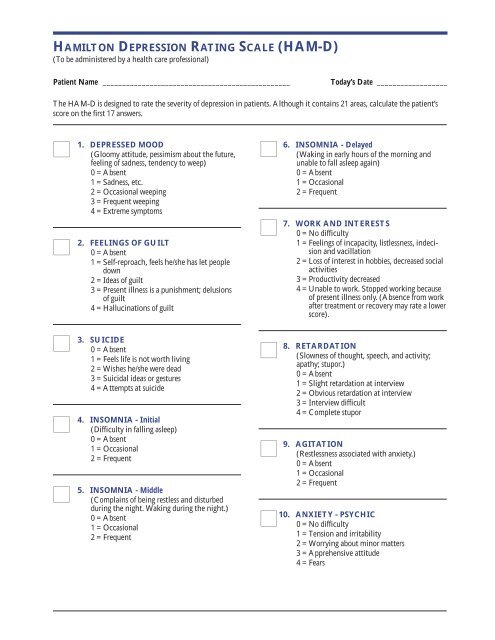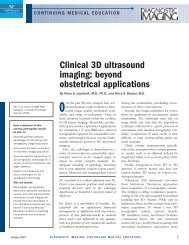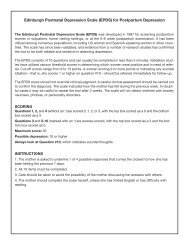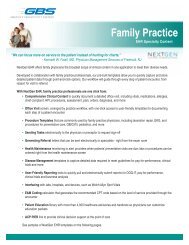hamilton depression rating scale (ham-d)
hamilton depression rating scale (ham-d)
hamilton depression rating scale (ham-d)
You also want an ePaper? Increase the reach of your titles
YUMPU automatically turns print PDFs into web optimized ePapers that Google loves.
HAMILTON DEPRESSION RATING SCALE (HAM-D)<br />
(To be administered by a health care professional)<br />
Patient Name ________________________________________________<br />
Today’s Date __________________<br />
The HAM-D is designed to rate the severity of <strong>depression</strong> in patients. Although it contains 21 areas, calculate the patient’s<br />
score on the first 17 answers.<br />
■<br />
■<br />
■<br />
■<br />
■<br />
1. DEPRESSED MOOD<br />
(Gloomy attitude, pessimism about the future,<br />
feeling of sadness, tendency to weep)<br />
0 = Absent<br />
1 = Sadness, etc.<br />
2 = Occasional weeping<br />
3 = Frequent weeping<br />
4 = Extreme symptoms<br />
2. FEELINGS OF GUILT<br />
0 = Absent<br />
1 = Self-reproach, feels he/she has let people<br />
down<br />
2 = Ideas of guilt<br />
3 = Present illness is a punishment; delusions<br />
of guilt<br />
4 = Hallucinations of guilt<br />
3. SUICIDE<br />
0 = Absent<br />
1 = Feels life is not worth living<br />
2 = Wishes he/she were dead<br />
3 = Suicidal ideas or gestures<br />
4 = Attempts at suicide<br />
4. INSOMNIA - Initial<br />
(Difficulty in falling asleep)<br />
0 = Absent<br />
1 = Occasional<br />
2 = Frequent<br />
5. INSOMNIA - Middle<br />
(Complains of being restless and disturbed<br />
during the night. Waking during the night.)<br />
0 = Absent<br />
1 = Occasional<br />
2 = Frequent<br />
■<br />
■<br />
■<br />
■<br />
■<br />
6. INSOMNIA - Delayed<br />
(Waking in early hours of the morning and<br />
unable to fall asleep again)<br />
0 = Absent<br />
1 = Occasional<br />
2 = Frequent<br />
7. WORK AND INTERESTS<br />
0 = No difficulty<br />
1 = Feelings of incapacity, listlessness, indecision<br />
and vacillation<br />
2 = Loss of interest in hobbies, decreased social<br />
activities<br />
3 = Productivity decreased<br />
4 = Unable to work. Stopped working because<br />
of present illness only. (Absence from work<br />
after treatment or recovery may rate a lower<br />
score).<br />
8. RETARDATION<br />
(Slowness of thought, speech, and activity;<br />
apathy; stupor.)<br />
0 = Absent<br />
1 = Slight retardation at interview<br />
2 = Obvious retardation at interview<br />
3 = Interview difficult<br />
4 = Complete stupor<br />
9. AGITATION<br />
(Restlessness associated with anxiety.)<br />
0 = Absent<br />
1 = Occasional<br />
2 = Frequent<br />
10. ANXIETY - PSYCHIC<br />
0 = No difficulty<br />
1 = Tension and irritability<br />
2 = Worrying about minor matters<br />
3 = Apprehensive attitude<br />
4 = Fears
HAMILTON DEPRESSION RATING SCALE (HAM-D)<br />
(To be administered by a health care professional)<br />
■<br />
■<br />
■<br />
■<br />
■<br />
■<br />
11. ANXIETY - SOMATIC<br />
Gastrointestinal, indigestion<br />
Cardiovascular, palpitation, Headaches<br />
Respiratory, Genito-urinary, etc.<br />
0 = Absent<br />
1 = Mild<br />
2 = Moderate<br />
3 = Severe<br />
4 = Incapacitating<br />
12. SOMATIC SYMPTOMS -<br />
GASTROINTESTINAL<br />
(Loss of appetite , heavy feeling in abdomen;<br />
constipation)<br />
0 = Absent<br />
1 = Mild<br />
2 = Severe<br />
13. SOMATIC SYMPTOMS - GENERAL<br />
(Heaviness in limbs, back or head; diffuse<br />
backache; loss of energy and fatiguability)<br />
0 = Absent<br />
1 = Mild<br />
2 = Severe<br />
14. GENITAL SYMPTOMS<br />
(Loss of libido, menstrual disturbances)<br />
0 = Absent<br />
1 = Mild<br />
2 = Severe<br />
15. HYPOCHONDRIASIS<br />
0 = Not present<br />
1 = Self-absorption (bodily)<br />
2 = Preoccupation with health<br />
3 = Querulous attitude<br />
4 = Hypochondriacal delusions<br />
16. WEIGHT LOSS<br />
0 = No weight loss<br />
1 = Slight<br />
2 = Obvious or severe<br />
■<br />
■<br />
■<br />
■<br />
■<br />
17. INSIGHT<br />
(Insight must be interpreted in terms of patient’s<br />
understanding and background.)<br />
0 = No loss<br />
1 = Partial or doubtfull loss<br />
2 = Loss of insight<br />
TOTAL ITEMS 1 TO 17: _______________<br />
0 - 7 = Normal<br />
8 - 13 = Mild Depression<br />
14-18 = Moderate Depression<br />
19 - 22 = Severe Depression<br />
> 23 = Very Severe Depression<br />
18. DIURNAL VARIATION<br />
(Symptoms worse in morning or evening.<br />
Note which it is. )<br />
0 = No variation<br />
1 = Mild variation; AM ( ) PM ( )<br />
2 = Severe variation; AM ( ) PM ( )<br />
19. DEPERSONALIZATION AND<br />
DEREALIZATION<br />
(feelings of unreality, nihilistic ideas)<br />
0 = Absent<br />
1 = Mild<br />
2 = Moderate<br />
3 = Severe<br />
4 = Incapacitating<br />
20. PARANOID SYMPTOMS<br />
(Not with a depressive quality)<br />
0 = None<br />
1 = Suspicious<br />
2 = Ideas of reference<br />
3 = Delusions of reference and persecution<br />
4 = Hallucinations, persecutory<br />
21. OBSESSIONAL SYMPTOMS<br />
(Obsessive thoughts and compulsions against<br />
which the patient struggles)<br />
0 = Absent<br />
1 = Mild<br />
2 = Severe<br />
* Adapted from Hamilton, M. Journal of Neurology, Neurosurgery, and Psychiatry. 23:56-62, 1960.

















